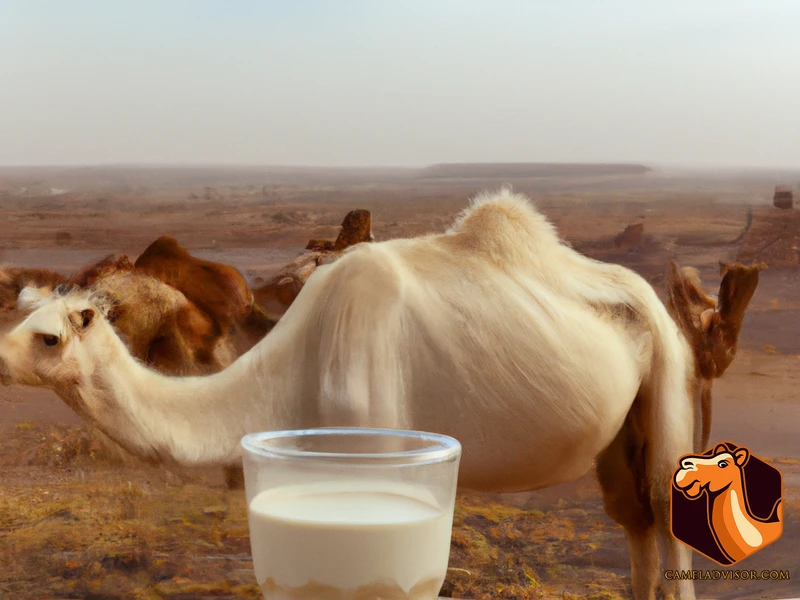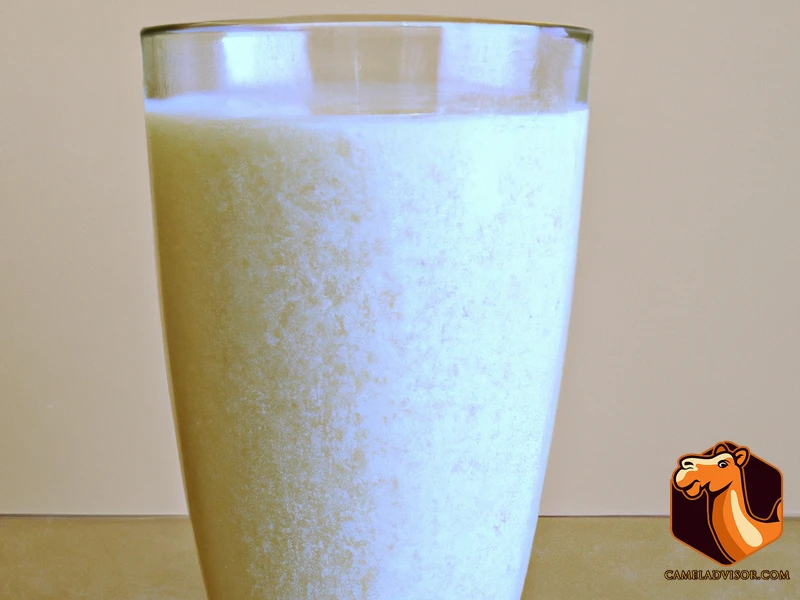Contents
Introduction

When it comes to milk, there are plenty of options out there – from cow’s milk to almond milk to soy milk. However, there’s one type of milk that’s been gaining popularity lately for its touted health benefits: camel milk. While cow’s milk has been a staple in many households for centuries, some claim that camel milk is the superior choice due to its unique nutritional properties. In this article, we’ll delve into the differences between camel milk and cow milk, and take a closer look at the potential health benefits of each.
Benefits of Milk
Milk is a nutrient-rich liquid produced by mammals to feed their young ones. It has numerous benefits for human health, including bone health, muscle building, weight loss, hydration, and immune system boost.
| Bone Health: Milk is a rich source of calcium, which is essential for building and maintaining strong bones and teeth. |
| Muscle Building: Milk contains high-quality proteins that are necessary for muscle growth and repair. |
| Weight Loss: Milk is a low-calorie beverage that can aid in weight loss when consumed as a part of a balanced diet. |
| Hydration: Milk is an excellent source of hydration as it is rich in water, electrolytes, and essential nutrients. |
| Immune System Boost: Milk contains immunoglobulins and other nutrients that help boost the immune system and fight against diseases and infections. |
Both camel milk and cow milk offer these benefits, but in varying degrees. Let’s take a closer look at the nutritional comparison between the two types of milk.
Nutritional Comparison
When it comes to choosing between camel milk and cow milk, it’s important to consider their nutritional value. Camel milk and cow milk have different nutritional profiles, and understanding these differences can help you make an informed decision about which milk is better for your health. While both types of milk are excellent sources of nutrition, each has its own unique advantages. To learn more about the nutritional value of camel milk, check out our article on the topic, which provides a detailed breakdown of the vitamins, minerals, and other beneficial compounds found in this nutritious beverage.
Camel Milk
Camel milk is a nutritious and unique alternative to cow milk. It has been consumed for centuries in the Middle East and Africa, where camels are more prevalent. Here are some key points to keep in mind about camel milk:
– Nutritional value: Camel milk is an excellent source of nutrients, including protein, vitamins, and minerals. It contains less fat and cholesterol than cow milk and is also rich in antioxidants and immune-boosting compounds. According to a study, the nutritional value of camel milk is higher than that of cow milk.
– Lactose intolerance: One of the biggest benefits of camel milk is that it can be consumed by people who are lactose intolerant. This is because it contains less lactose than cow milk and also has lactase, an enzyme that helps digest lactose. Drinking camel milk can provide a great relief for people struggling with lactose intolerance./camel-milk-digestion-relief/
– Diabetes management: Camel milk has been shown to have positive effects on blood sugar levels in people with diabetes. It contains insulin-like proteins that can help regulate glucose metabolism and improve insulin sensitivity. Drinking camel milk regularly can lead to better blood sugar control and reduce the risk of diabetes complications./camel-milk-manage-diabetes/
– Immune system: Camel milk has natural antibodies that can help fight off infections and boost the immune system. This is especially beneficial for people with weakened immune systems, such as those undergoing chemotherapy or suffering from autoimmune diseases. Camel milk is well known to strengthen the immune system./camel-milk-immune-health/
– Autism: Some studies suggest that drinking camel milk can have positive effects on children with autism. The high levels of protein and micronutrients in camel milk have been linked to improved cognitive function and behavior in autistic children. It is said that camel milk consumption can possibly even help to cure autism.
– Heart health: Camel milk has been shown in studies to reduce cholesterol levels and blood pressure, which can improve heart health. The high levels of antioxidants in camel milk also help to protect against heart disease. Camel milk can be a great addition to the diet for people who are concerned about their cardiovascular health. /5-health-benefits-camel-milk/
Camel milk is not only a nutritious alternative to cow milk but also has many potential health benefits. From diabetes management to immune system support, camel milk can be a great addition to a healthy diet.
Cow Milk
Cow milk is a staple source of nutrition for many people worldwide. It is known to have high levels of calcium, vitamin D, and other essential nutrients. According to a study published in the Journal of Dairy Science, cow milk contains more than 200 different fatty acids, including omega-3 and omega-6 fatty acids, which have been linked to improved heart health.
Here are some of the essentials nutrients found in cow milk:
- Calcium: Cow’s milk is rich in calcium, which is important for healthy bones and teeth.
- Protein: Cow’s milk is a good source of high-quality protein, which is essential for building and repairing tissues.
- Vitamin D: Cow’s milk is fortified with vitamin D, which helps the body absorb calcium and maintain healthy bones.
- Vitamin B12: Cow’s milk is also a good source of vitamin B12, which is important for a healthy nervous system.
- Potassium: Cow’s milk is a good source of potassium, which helps regulate blood pressure and support heart health.
Despite its nutritional benefits, cow milk is not suitable for everyone. People who are lactose intolerant or have a milk allergy should avoid cow milk. Additionally, some people may choose to avoid cow milk due to ethical or environmental concerns.
If you are looking for an alternative to cow milk, you can consider camel milk. It is lower in lactose and has a different nutritional profile that may offer unique health benefits.
Benefits of Camel Milk

Camel milk has been consumed for centuries in various parts of the world, especially in desert areas. With its creamy texture and naturally sweet taste, this milk gained popularity over the years, and recently more and more people are interested in its potential health benefits. Research indicates that camel milk can play a significant role in improving gut health, fighting diseases, promoting skin health, and providing essential nutrients such as calcium. For those interested in learning more about the specific advantages of consuming camel milk, keep reading below. Additionally, for those who wish to read more about camel milk and gut health, click here.
Lactose Intolerance
Lactose intolerance is a common digestive disorder that affects millions of people worldwide. It is caused by the body’s inability to digest lactose, which is the primary sugar found in milk. This condition can cause uncomfortable symptoms such as bloating, gas, and diarrhea. However, camel milk may offer a solution for those with lactose intolerance.
Unlike cow milk, which contains lactose, camel milk has lower levels of lactose, making it easier for people with lactose intolerance to digest. According to a study published in the Journal of Dairy Research, camel milk has been shown to be better tolerated by lactose-intolerant individuals compared to cow milk.
In addition to being easier to digest, camel milk also contains unique proteins and immunoglobulins that may help reduce inflammation and improve gut health. These properties may further benefit individuals with lactose intolerance, as inflammation in the gut can worsen digestive symptoms.
Furthermore, camel milk contains prebiotic oligosaccharides which act as food for beneficial gut bacteria and promote digestive health. This can help maintain a healthy gut microbiome and alleviate symptoms of lactose intolerance.
For those who suffer from lactose intolerance, camel milk can offer a healthy and nutritious alternative to traditional cow milk. With its unique advantages, including lower lactose levels, anti-inflammatory properties and prebiotic oligosaccharides, camel milk may be a viable option to consider.
To learn more about other benefits of camel milk, check out our article on the fight against disease, the benefits for skin health, and the role of camel milk in promoting calcium health.
Diabetes
Diabetes is a chronic disease that affects the body’s ability to produce or respond to insulin, leading to high blood sugar levels. It is becoming increasingly common and affects millions of people worldwide. Both camel milk and cow milk have been studied for their potential benefits in managing diabetes.
Camel Milk: A study published in the Journal of Dairy Science found that drinking 500ml of camel milk per day for eight weeks resulted in improved blood sugar levels in people with type 2 diabetes. Camel milk contains insulin-like proteins that may help regulate blood sugar levels. Additionally, it has a lower glycemic index than cow milk, meaning it causes a slower and steadier increase in blood sugar levels.
Cow Milk: Cow milk also contains proteins that can help regulate blood sugar levels. In a study published in the European Journal of Clinical Nutrition, researchers found that consuming low-fat dairy products, including cow milk, was associated with a reduced risk of type 2 diabetes. However, it is important to note that cow milk has a higher lactose content than camel milk, which can cause a quicker increase in blood sugar levels.
Comparison: Here is a table comparing the potential benefits of camel milk and cow milk for managing diabetes:
| Camel Milk | Cow Milk | |
|---|---|---|
| Insulin-like proteins | Contains | Contains |
| Glycemic index | Lower | Higher |
| Lactose content | Lower | Higher |
| Association with reduced risk of type 2 diabetes | N/A | Positive |
While both camel milk and cow milk have potential benefits for managing diabetes, camel milk may be a better option for those who are lactose intolerant or looking for a slower and steadier increase in blood sugar levels. However, more research is needed to fully understand the effects of camel milk on diabetes management.
Immune System
Camel milk is known for its various benefits, including boosting the immune system due to the presence of unique proteins and nutrients that can protect the body from infections and diseases. Here are some ways in which camel milk can help strengthen your immune system:
- Higher Levels of Immunoglobulins: Camel milk contains higher levels of immunoglobulins than cow milk, which are antibodies produced by the immune system to identify and neutralize harmful pathogens. Immunoglobulins in camel milk have been found to be effective against a wide range of bacteria, viruses, and fungi, making it a great choice for people with compromised immune systems.
- Antimicrobial Properties: The presence of certain antimicrobial peptides in camel milk can help fight off various microorganisms, including bacterial and viral infections. According to research, these peptides have been shown to have a broad-spectrum antimicrobial effect that is effective against a range of microorganisms.
- Antioxidant Capacity: Camel milk is rich in antioxidants that scavenge harmful free radicals in the body and prevent cellular damage. Antioxidants like vitamins C and E, and other compounds like superoxide dismutase and catalase, are found in higher amounts in camel milk compared to cow milk, making it a better choice for boosting the immune system.
- Anti-Inflammatory Properties: Chronic inflammation can weaken the immune system and increase the risk of various diseases. Camel milk contains anti-inflammatory compounds that can help reduce inflammation in the body and improve overall immune function. Research has shown that camel milk can prevent the production of pro-inflammatory cytokines that contribute to chronic inflammation.
The immune-boosting properties of camel milk make it a great choice for people who want to strengthen their immune system and protect themselves against infections and diseases. Its higher levels of immunoglobulins, antimicrobial and antioxidant properties, and anti-inflammatory compounds make it a valuable addition to a healthy diet.
Autism
Studies have shown that camel milk may have beneficial effects for those with autism spectrum disorder. Some of the potential benefits that have been observed include:
- Improved Behavior: A study conducted by the Dubai-based Autism Research and Treatment Centre found that children who drank camel milk showed significant improvements in behavior, including a reduction in hyperactivity and better focus.
- Reduced Inflammation: Another study published in the Journal of Ethnopharmacology found that camel milk contains anti-inflammatory properties that can help reduce inflammation in the gut, which is often a problem for those with autism.
- Regulated Blood Sugar: Camel milk contains an insulin-like protein that has been shown to help regulate blood sugar levels. This is important for those with autism as they often have issues with blood sugar imbalance.
- Rich in Nutrients: Camel milk is rich in a variety of nutrients, including vitamin C, iron, and calcium. These nutrients are important for overall health and may help improve some of the symptoms of autism.
It should be noted, however, that more research is needed to fully understand the potential benefits of camel milk for those with autism. While some studies have shown promising results, larger and more comprehensive studies are needed to confirm these findings. Additionally, camel milk is not a cure for autism and should not be used as a replacement for traditional treatments.
Heart Health
Both camel milk and cow milk have their own heart health benefits. Here are some of the benefits of each:
Camel Milk:
- Low in fat:
- Rich in potassium:
- High in vitamin B1:
Camel milk has a lower fat content than cow milk, making it a better option for those looking to reduce their overall fat intake. High fat intake has been linked to an increased risk of heart disease.
Camel milk is rich in potassium, which helps regulate blood pressure levels. High blood pressure is a major risk factor for heart disease.
Camel milk is a good source of vitamin B1, which is important for healthy heart function. Vitamin B1 helps convert food into energy and supports the proper functioning of the heart.
Cow Milk:
- High in calcium:
- Rich in conjugated linoleic acid (CLA):
- Fortified with vitamin D:
Cow milk is a rich source of calcium, which is essential for building and maintaining strong bones. Studies have also shown that adequate calcium intake may help protect against heart disease.
Cow milk contains CLA, a type of fat that has been linked to a reduced risk of heart disease. CLA has been shown to improve cholesterol levels and reduce inflammation, both of which are important for heart health.
Cow milk is often fortified with vitamin D, which is essential for healthy bone and teeth formation. Some studies have also suggested that vitamin D may have a protective effect against heart disease.
Both camel milk and cow milk can be part of a heart-healthy diet. It is important to choose low-fat options and consider adding fortified milk to your diet to maximize its heart health benefits.
Benefits of Cow Milk
When it comes to discussing the health benefits of milk, cow milk is a common topic of conversation. This staple in many households has numerous benefits that may surprise you. From promoting bone health to aiding in weight loss, cow milk is a versatile and nutritious option that provides a wide range of advantages. Let’s take a closer look at some of the benefits of cow milk and why it may be a great addition to your diet.
Bone Health
When it comes to bone health, cow milk is often the go-to option due to its high calcium content. One cup of cow milk contains approximately 300 milligrams of calcium, which is important for building and maintaining strong bones. Cow milk is often fortified with vitamin D, which also plays a role in bone health.
However, camel milk also contains a significant amount of calcium. One cup of camel milk provides about 30% of the recommended daily intake of calcium. Camel milk is also rich in other nutrients that are important for bone health, such as vitamin B12 and potassium.
It’s worth noting that there are other sources of calcium besides milk, such as leafy greens and fortified products like tofu and orange juice. Incorporating a variety of calcium-rich foods into your diet is important for overall bone health.
There are some cases where cow milk may not be the best option for bone health. For example, some people may have difficulty absorbing the calcium in cow milk due to lactose intolerance. In these cases, alternatives like soy milk or lactose-free cow milk may be a better option. Additionally, research has suggested that high consumption of cow milk may actually increase the risk of bone fractures in women, particularly after menopause.
Both camel milk and cow milk can contribute to bone health, but it’s important to consider individual needs and circumstances when choosing which type of milk to consume.
Muscle Building
Cow milk is well known for its benefits in building and maintaining strong muscles. It contains two essential nutrients, protein and calcium, which are crucial for muscle growth and development.
Protein: Cow milk is abundant in high-quality protein, containing all nine essential amino acids that our body needs to build and repair muscle tissue. One cup of cow milk (244g) provides about 8 grams of protein. Protein is necessary for muscle recovery and growth after exercise, as it helps repair the micro-tears in muscle tissue that occur during physical activity.
Calcium: Calcium is also essential for muscle function and contraction. It helps regulate muscle contractions and aids in transmitting nerve impulses that control muscle movement. One cup of cow milk provides about 30% of the daily recommended intake of calcium, making it an excellent source for those who need additional calcium to support muscle development.
In addition to protein and calcium, cow milk also contains other important vitamins and minerals that can aid in muscle growth, including vitamin D and potassium. Vitamin D helps the body absorb calcium, which is essential for healthy bones and muscles. Potassium helps regulate electrolyte balance and assists in muscle function.
It’s essential to note that while cow milk is an excellent source of protein and calcium, there are many plant-based alternatives that can provide similar benefits. Additionally, individuals with lactose intolerance or other allergies or sensitivities may need to seek alternative sources of protein and calcium to support their muscle-building goals.
Cow milk can be a great addition to a balanced diet for anyone looking to build strong muscles. By providing essential nutrients like protein and calcium, it can help support muscle growth and recovery, as well as promote overall health and wellness.
Weight Loss
One of the benefits that cow milk offers is its potential for aiding in weight loss. Cow milk is considered a great source of protein and therefore, can help reduce food cravings and promote feelings of fullness, which can lead to consuming fewer calories overall.
Cow milk is also an excellent source of calcium which has been linked to weight loss as well. Studies have shown that increasing calcium intake can lead to reductions in body weight, body fat, and waist circumference. Calcium works by binding to fat in the small intestine and preventing its absorption, which leads to excretion from the body.
On the other hand, camel milk has been shown to be lower in fat content than cow milk, which may make it a better option for those looking to control their calorie intake. Camel milk also contains more protein and fiber than cow milk, both of which can aid in weight loss. Protein is known to enhance feelings of fullness, while fiber helps to slow down the digestion process, keeping one feeling full for longer periods.
In the table below, you can see a nutritional comparison of cow milk and camel milk, showing their differences in nutrient content which may impact weight loss.
| Cow Milk (per 100ml) | Camel Milk (per 100ml) | |
|---|---|---|
| Calories | 42 | 61 |
| Protein | 3.4g | 3.6g |
| Fat | 1.8g | 3g |
| Calcium | 120mg | 110mg |
| Fiber | 0g | 0.2g |
While both cow and camel milk can potentially aid in weight loss in different ways, it’s important to note that simply consuming one type of milk may not lead to significant weight loss without also maintaining a healthy diet and engaging in regular exercise.
Hydration
When it comes to keeping the body hydrated, both camel milk and cow milk can play a crucial role. However, cow milk has a slight edge in terms of hydrating properties thanks to its higher water content. Cow milk contains around 87% water, while camel milk has a water content of around 81%.
In addition to water content, electrolytes also play a role in hydration. Camel milk has higher levels of certain electrolytes, including potassium, magnesium, and calcium, which can aid in hydration. Potassium, in particular, is instrumental in regulating fluid balance in the body, making it an essential electrolyte for hydration and blood pressure regulation.
Cow milk may also contain a slight edge in terms of rehydration after exercise. Studies have shown that low-fat cow milk can be just as effective as sports drinks in replacing fluids and electrolytes lost during exercise. Cow milk also contains carbohydrates in the form of lactose, which can aid in glycogen replenishment and muscle recovery after intense workouts.
It’s important to note that both camel milk and cow milk can be effective in hydrating the body. The choice ultimately comes down to personal preference and individual health needs. It’s important to consume adequate fluids throughout the day, whether through milk or other hydrating beverages, to maintain optimal hydration levels and prevent dehydration.
Taste and Texture

When it comes to taste and texture, there are some noticeable differences between camel milk and cow milk. Camel milk has a slightly salty taste due to its higher mineral content, which some people may find off-putting. However, others may enjoy its unique flavor that can be described as slightly nutty or smoky. In terms of texture, camel milk is thinner in consistency than cow milk, with a watery mouthfeel.
On the other hand, cow milk has a milder and sweeter taste compared to camel milk. Its texture is thicker and creamier, making it more enjoyable for some people. Cow milk is a popular ingredient in many recipes, as it blends well with a variety of other flavors.
Taste and texture preferences can be subjective, and some people may find both camel and cow milk to be equally delicious or unappealing. It all comes down to individual taste and the flavors and textures you grew up with.
It’s worth noting that the taste of milk can depend on several factors, including the breed of the animal, their diet, and the processing practices used. For example, milk from Jersey cows may have a different taste than milk from Holstein cows, and milk that is ultra-pasteurized may have a slightly different flavor than milk that is not.
Taste and texture are just a small part of the equation when it comes to choosing between camel milk and cow milk. Nutritional content, health benefits, sustainability, and cost are all important factors to consider when making a decision.
Sustainability and Cost
When it comes to choosing between camel milk and cow milk, sustainability and cost are two important factors that cannot be overlooked. It is crucial to consider the environmental impact of the milk production process and the economic implications for both producers and consumers. Additionally, the cost comparison between the two types of milk can affect the accessibility and availability of this essential source of nutrition. Let’s explore the sustainability and cost considerations of both camel milk and cow milk in detail.
Environmental Impact
When it comes to the environmental impact of producing milk, there are some key differences between camel milk and cow milk.
One of the biggest factors to consider is water usage. Camels are better adapted to hot and arid environments than cows, which means they require less water to survive. According to some estimates, it can take up to 1,000 liters of water to produce just 1 liter of cow’s milk, while it only takes around 3 liters of water to produce 1 liter of camel milk. This makes camel milk a more efficient and sustainable choice in areas where water is scarce.
Another important consideration is land usage. In general, camels require less space than cows to roam and graze. This means that producing camel milk can have a smaller impact on natural habitats and land conservation efforts. Additionally, because camels are more resistant to desertification than cows, they can help prevent the spread of desertification.
The production of cow’s milk can also have a significant carbon footprint, as cows produce large amounts of methane gas during digestion. Methane is a potent greenhouse gas that contributes to climate change. In contrast, camels produce less methane than cows, which means that the production of camel milk may have a lower carbon footprint.
However, it’s important to note that there are other factors to consider when evaluating the environmental impact of camel milk and cow milk. For example, transportation costs and energy usage during processing and distribution can also have an impact. Additionally, there may be regional variations in the environmental impact of milk production depending on factors like climate, land availability, and farming practices.
While camel milk may have some advantages when it comes to environmental impact, it’s important to look at the full picture and consider multiple factors when making a decision about which type of milk to consume.
Here is a table summarizing some of the key environmental impact differences between camel milk and cow milk:
| Camel Milk | Cow Milk | |
|---|---|---|
| Water Usage | Requires less water | Can require up to 1,000 liters to produce 1 liter of milk |
| Land Usage | Requires less space and can help prevent desertification | Requires more space for grazing and can contribute to habitat destruction |
| Carbon Footprint | Produces less methane than cows | Produces significant amounts of methane gas |
Cost Comparison
When it comes to cost, it’s important to take into consideration a few factors when comparing camel milk and cow milk. Here are some things to keep in mind:
- Production Costs: Camel milk production is generally more expensive than cow milk production. Camels require specific diets and living conditions, as well as specialized milking techniques. This typically translates to a higher cost for camel milk compared to cow milk.
- Availability: Camel milk is not as readily available as cow milk, which can also impact cost. In many parts of the world, camel milk production is not as widespread, which can make it more difficult to find and more expensive to purchase.
- Location: Where you live can also impact the cost of camel and cow milk. If you live in an area where camel milk production is more common, it may be easier to find and less expensive than cow milk. On the other hand, if you live somewhere where cow milk is the norm, you may have to pay more (and potentially search harder) to find camel milk.
- Consumer Demand: Finally, consumer demand can also play a role in cost. If there is a high demand for camel milk in a particular area or market, it may drive up the cost. Conversely, if there is little demand for camel milk, it may be less expensive (but also harder to find).
It’s difficult to make a blanket statement about which type of milk is more expensive without taking these factors into account. However, as a general rule, camel milk tends to be more expensive than cow milk. If cost is a major concern, cow milk may be the more budget-friendly option.
Conclusion
In conclusion, both camel milk and cow milk have their own unique benefits for your health. While camel milk is a great option for those who are lactose intolerant or have certain health conditions such as diabetes, cow milk is an excellent source of calcium and protein which are essential for bone health and muscle building.
When it comes to taste and texture, it’s a personal preference, as both milks have their own distinct flavors and consistencies.
In terms of sustainability and cost, camel milk is a more environmentally friendly option due to the lower amount of resources needed for its production. However, it can be more expensive than cow milk due to the limited availability and higher production costs.
Ultimately, the choice between camel milk and cow milk comes down to personal preference and individual health needs. It’s important to consult with a healthcare professional or a registered dietitian to determine which type of milk is best for your specific health requirements. So, give both types of milk a try and decide which one suits your taste preferences and health needs the most.
Frequently Asked Questions
Question 1?
Which type of milk has more nutritional value, camel milk or cow milk?
Question 2?
Is camel milk a good option for people with lactose intolerance?
Question 3?
Is camel milk beneficial for diabetics?
Question 4?
Can camel milk help boost the immune system?
Question 5?
Is there any evidence that camel milk can benefit those with autism?
Question 6?
Does cow milk help build strong bones?
Question 7?
Can cow milk help with weight loss?
Question 8?
Is cow milk a good option for hydration?
Question 9?
Which milk has a richer taste, camel milk or cow milk?
Question 10?
Is one type of milk more environmentally sustainable than the other?







